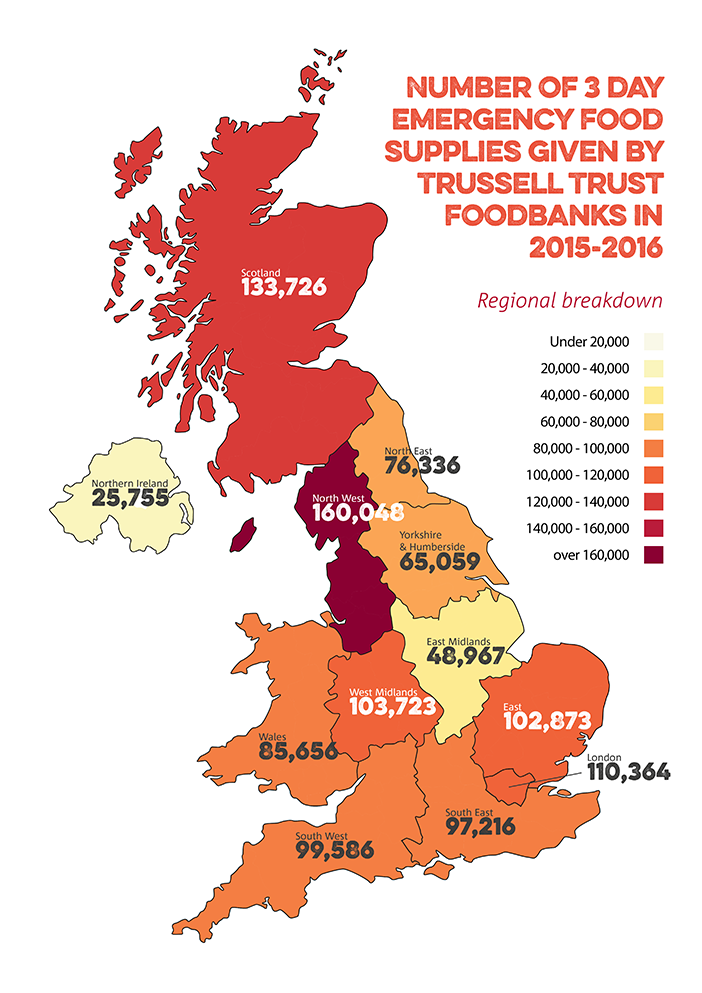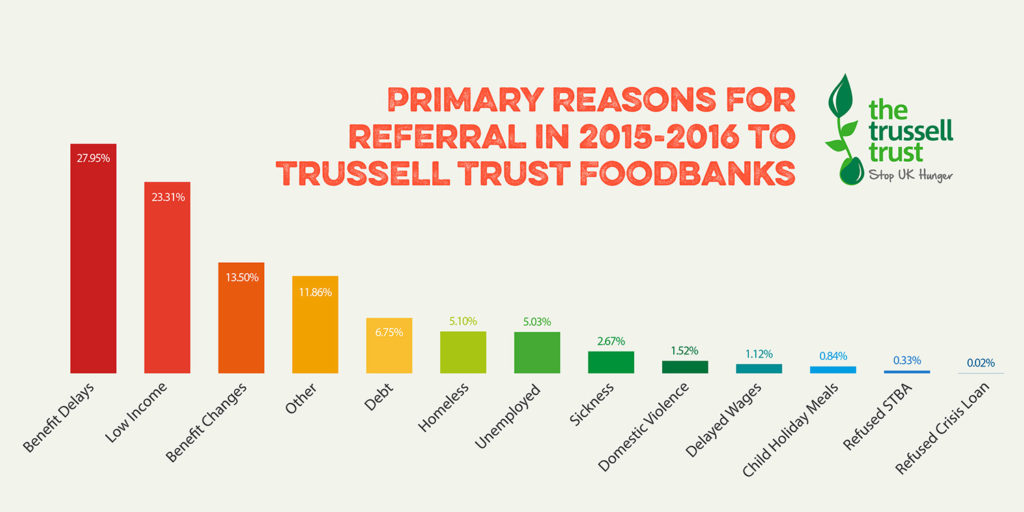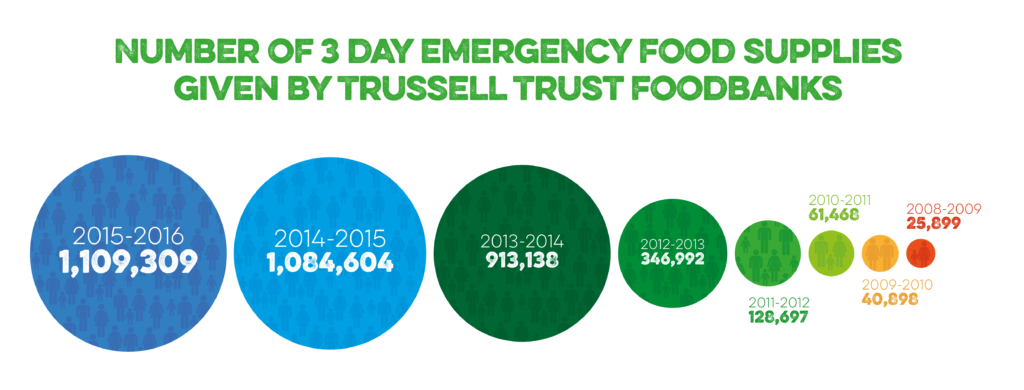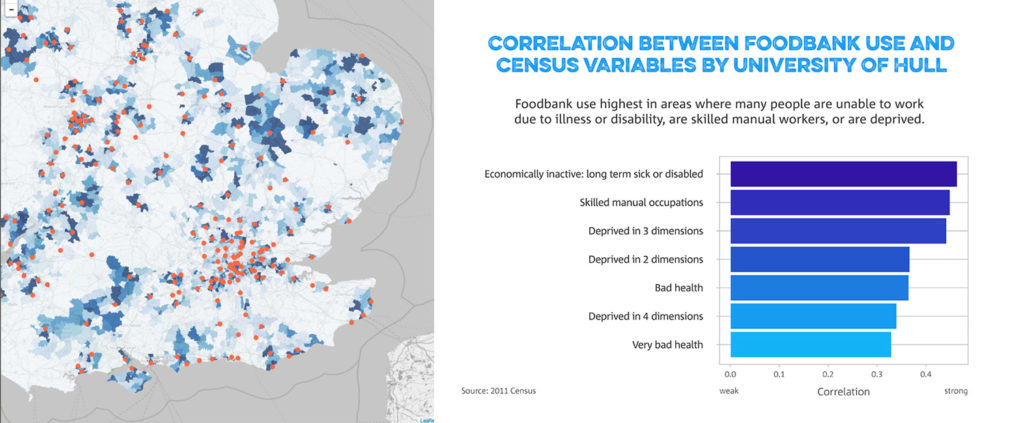1,109,309.
That’s the amount of three-day emergency food supplies our network of 424 foodbanks gave out to people in crisis during 2015/16, with 415,866 of those having gone to children.
“One million three-day food supplies given out by our foodbanks every year is one million too many. This must not become the new normal. We need to listen to the experiences of people facing hunger and poverty, and work to find solutions to this problem together.” – CEO, David McAuley
It’s a 2% increase on our foodbank figures released this time last year, when we first crossed the one million mark. And it’s happened again.
So how was this reflected across the country?
The heat map below shows foodbank usage in each region. The majority of regions saw foodbank use remain at record levels, and the biggest increases were in Northern Ireland (48% increase on 2014/15), Scotland (14% increase) and the East Midlands (13% increase).

What’s the biggest cause of foodbank use?

Benefit problems and changes remain the biggest cause of foodbank use, accounting for 42 percent of all referrals (28 percent benefit delay; 14 percent changes), a slight reduction on last year’s 44 percent, whilst low income has risen as a referral cause from 22 percent to 23 percent. This is also reinforced by new research from the University of Hull, Coppelia and AAM Associates.
The ‘Mapping Hunger’ report
For the first time, The Trussell Trust partnered with the University of Hull to develop new tools that help us better understand the drivers of foodbank use and the areas of greatest need. The ‘Mapping Hunger‘ report gives a fresh insight into UK hunger by mapping foodbank data against census data.
“This chart shows the strong correlations emerging at an electoral ward level between foodbank use and the percentage of the population with long term health problems or disabilities or in skilled, manual work.” – Simon Raper, a data scientist at Coppelia
We heard from foodbank clients like Kane…
“Hunger is very real in our country. Sometimes you just have to look a bit harder to see it.” > https://t.co/CeJy5dWGZA #onemilliontoomany
— The Trussell Trust (@TrussellTrust) April 15, 2016
Kane and his wife Chelsea were both working professionals, but when his mental health deteriorated and there were complications with her pregnancy, they were both temporarily unable to work. Read their story here.
“We never expected to need a foodbank, but our lives completely changed in two months. Just five minutes to breathe can really make all the difference, that’s why foodbanks are such a lifeline.” – Kane
And foodbanks across the country joined the conversation on Twitter, sharing stories from their clients…
Rich* came to us after his illness meant he was unable to work. "The help I got gave me hope" #onemilliontoomany pic.twitter.com/4nDPETwT1w
— Hull Foodbank (@HullFoodbank) April 15, 2016
"If it's not for the #foodbank, I don't know where I'd be right now" > https://t.co/JNV3QFw0kq #onemilliontoomany
— The Trussell Trust (@TrussellTrust) April 15, 2016
"Without Foodbank my family would spend another week without food." One of the many #FoodbankClients #onemilliontoomany #Camden #ChalkFarm
— Kentish Town Foodbank (@Kentishtownfb) April 15, 2016
“I had worked all my life until my health deteriorated” > https://t.co/cedoT8rdjk #onemilliontoomany #foodbanks pic.twitter.com/56eCWzH6ty
— The Trussell Trust (@TrussellTrust) April 15, 2016
volunteering at @TrussellTrust @NorthBristolFB I've met people in all types of situations; people don't want to need it #onemilliontoomany
— Dr Stephanie Denning (@SJ_Denning) April 15, 2016
“I’ve worked all my life & never thought I’d need a #foodbank” > https://t.co/zDEP32NoQf #onemilliontoomany pic.twitter.com/LwMDA92jwm
— The Trussell Trust (@TrussellTrust) April 15, 2016
"Coming to a place without judgement, and a warm welcome made all the difference" #onemilliontoomany
— Newtownards Foodbank (@ArdsFoodbank) April 15, 2016
' I can't tell you how relieved I am to know that my children are going to be able to eat '. #onemilliontoomany
— Leeds N & W foodbank (@NW_leedsfood) April 15, 2016
The foodbank helped when Marcella's spinal condition stopped her working >https://t.co/l4uzcu8X8G #onemilliontoomany pic.twitter.com/0xuWUxUhA3
— The Trussell Trust (@TrussellTrust) April 15, 2016
Read the official press release on our April 2016 stats here and find out more information about our previous foodbank figures here.
Don’t forget to join the conversation on twitter…#onemilliontoomany





